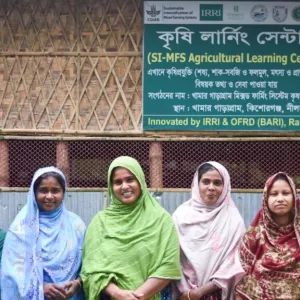How mixed farming innovations are shaping the livelihood of rural Bangladesh
By Abdul Haque, Sharif Ahmed, and Humnath Bhandari The economy of Bangladesh is largely dependent on agriculture, and most of the people are dependent on it directly and indirectly. Agriculture remains vital for GDP (11.3%), employment, and food security. But nowadays, this sector faces several challenges, such as climate change, labor shortages, increasing input costs, and price volatility of produced

How mixed farming innovations are shaping the livelihood of rural Bangladesh
By Abdul Haque, Sharif Ahmed, and Humnath Bhandari
The economy of Bangladesh is largely dependent on agriculture, and most of the people are dependent on it directly and indirectly. Agriculture remains vital for GDP (11.3%), employment, and food security. But nowadays, this sector faces several challenges, such as climate change, labor shortages, increasing input costs, and price volatility of produced products. Low income and unstable earnings from farming due to seasonal requirements push many workers to seek better-paying jobs outside agriculture. Garments, construction, transport, and services offer more stable, better-paying jobs, attracting rural youth.
Mixed farming systems (MFS) offer a sustainable solution to Bangladesh’s agricultural challenges by diversifying income sources and reducing dependency on a single sector. By integrating crops, livestock, aquaculture, and forestry, farmers can optimize their resource use, for example crop residues like rice straw and maize stover can feed cattle and goats, while livestock manure can be composted into organic fertilizer. Moreover, MFS innovations provide a continuous supply of diverse, nutrient-rich foods, boosting household nutrition and community food security. This approach can also engage women and attract agricultural labor by creating stable employment opportunities.
Implemented in Bangladesh from 2022 to 2024, the CGIAR Initiative on Mixed Farming Systems (MFS) and IRRI worked on a number of innovations that significantly contributed to enhancing the livelihoods of smallholder farmers in both the northern and southern regions of Bangladesh. The achievements and insights of some innovations are stated below.

